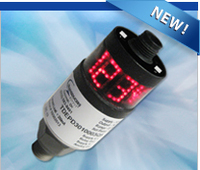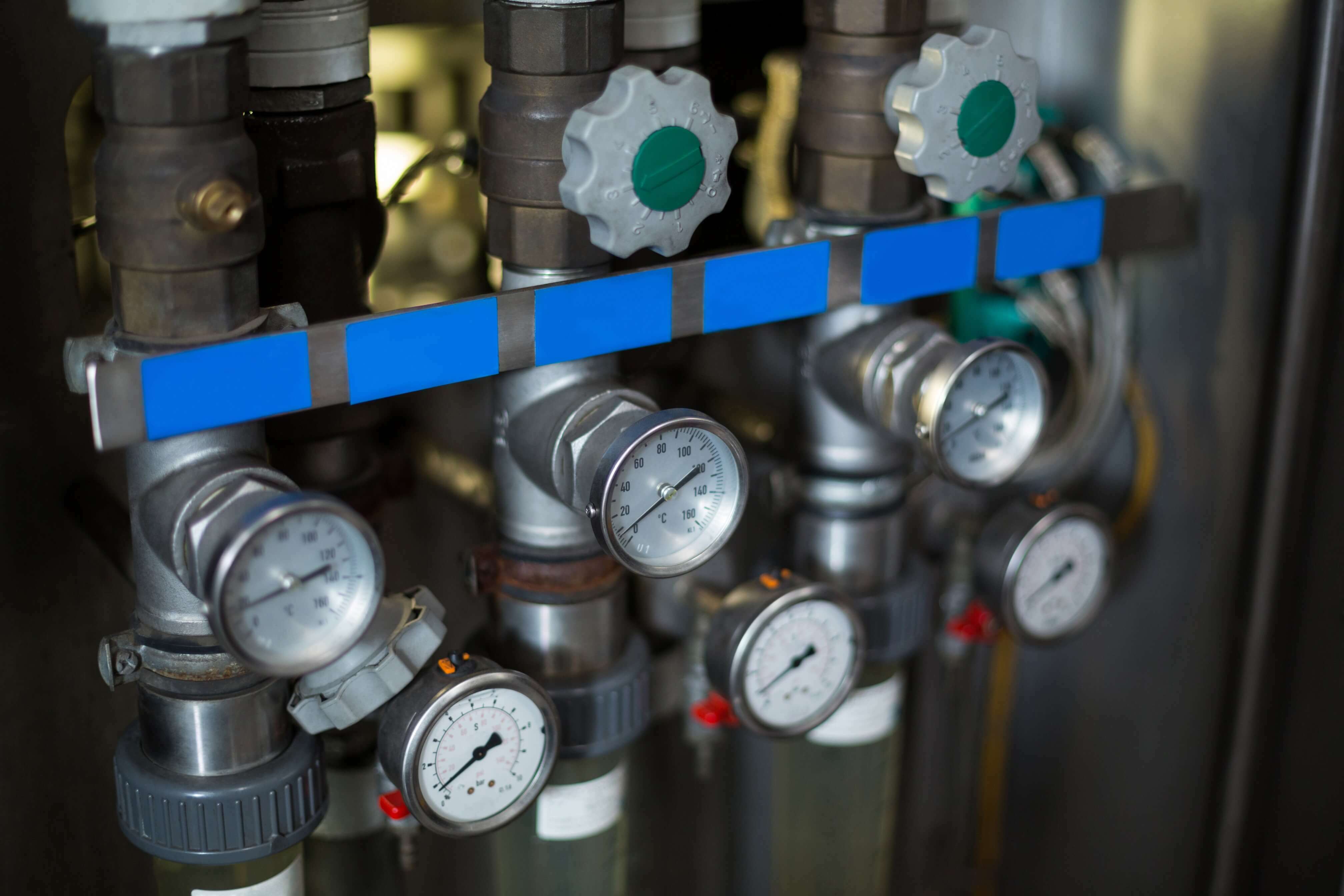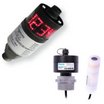SUB CATEGORIES OF Pressure Instrument
There are no products listed under this category.
Today, different pressure measurement devices are used to measure the pressure level of gases and liquids in process industries. These systems have been around over the years and evolved with various features and technological advancements. Proper selection of pressure instruments requires in-depth knowledge of applications and the equipment used. Cannon Water Technology has expertise in both product knowledge as well as application experience. The company offers superior quality, performance-driven instrument to measure pressure for commercial and industrial applications. We offer dozens of brands to choose from to match your exact requirements.
List of Pressure Measuring Instruments Offered by Cannon Water Technology
At Cannon Water, we have the capability to provide you the following pressure instruments for your specific applications:
- Pressure Switches: Our mechanical pressure instruments are cost efficient tools that help improve the efficiency of water treatment operations. They sense the pressure level of fluids and automatically activate or deactivate other mechanical devices such as pumps and compressors when the pressure reaches a preset threshold.
- Pressure Transducers: Also called pressure transmitters, they are mainly designed to measure the pressure of gases and liquids used in process industries. Our pressure transducers are made using the finest quality material, which can withstand humidity, variations in temperatures, and several other environmental parameters.
- Pressure Gauges: At Cannon Water, we offer high-accuracy pressure gauges that can measure pressure fluctuations in real-time. Thus, they are best-suited for high-pressure water transmission systems. They are resistant to corrosion and harsh chemicals, and are made from RoHS compliant materials such as PP, PVC, CPVC, PVDF, and more.
- Pressure Sensors: Our pressure sensors and transducers can measure pressure in water tanks and fluids used in process industries. They are equipped with high-quality LED displays which will clearly inform you regarding pressure levels without reading values. Our pressure sensors are electronically designed and provide reliable and safe performance in many challenging industrial environments.
How to Measure Pressure Using Pressure Instruments?
Pressure measurement is of utmost importance across industries for safe and efficient operation of equipment and integrated systems. Precise pressure measurement relies on instruments, such as gauges or sensors, chosen based on the type of pressure – gauge, absolute, or differential. Here are some pointers for better understanding.
- The first step is to determine the type of pressure that needs to be measured. This could be absolute pressure, gauge pressure, or differential pressure. Identifying the type of pressure ensures that the right approach and appropriate instrument is selected.
- Next, the instrument must be calibrated before taking any measurements with standard or following the manufacturer's specific guidelines. This ensures that the readings are reliable and reflective of actual pressure conditions.
- Before taking a pressure reading, ensure the systems are installed and functional. This includes a safety check to confirm there are no leaks or pressure fluctuations. If necessary, isolate the system section being tested to prevent accidents or incorrect readings due to system-wide pressure changes.
- Attach the measuring instrument to the appropriate connection point. Ensure all connections are correctly sealed to avoid leaks leading to inaccurate readings. If using a digital gauge, simply check the display. For analog gauges, carefully read the needle's position to determine the pressure value.
- Record the pressure reading and the units used, such as psi, bar, or Pascals. Document the details to monitor trends or for further analysis and future referencing.
- Disconnect the pressure instrument after measurements are complete. After disconnecting, clean the instrument according to the manufacturer’s guidelines and store it properly to prolong its lifespan and maintain accuracy for future use.
- Analyze the collected data by comparing it with the standard values. This can be helpful in industrial maintenance or quality assurance, where pressure deviations might indicate leaks, blockages, or malfunctioning components.
Significance of Pressure Measuring Instruments in Industrial Applications
The significance of pressure instruments as a safety concern lies in several key areas. Here are some pointers.
- Preventing Equipment Failure: Pressure instruments are crucial for monitoring the pressure within enclosed systems, such as pipes, boilers, and tanks. Excessive pressure can result in equipment failure, leaks, or catastrophic explosions. By providing real-time pressure data, these instruments help operators keep pressure levels within safe limits.
- Avoiding Overpressure: Overpressure can occur due to malfunctioning valves, blockages, or process upsets. Pressure instruments detect and alert personnel to high-pressure conditions, which can trigger alarms or safety mechanisms. These actions prevent ruptures that could result in significant damage and safety hazards.
- Ensuring Personnel Safety: High or fluctuating pressures are dangerous for personnel working near pressurized equipment. When a system fails under pressure, it can result in chemical leaks or steam release, causing severe injury or fatal accidents. Pressure instruments help maintain a stable environment, minimizing such risks to personnel.
- Maintaining Process Integrity: Several industrial processes involve chemicals, steam, or high-pressure gases. Maintaining appropriate pressure levels is crucial to ensure product quality and process stability.
- Protection against Environmental Hazards: In industrial processes, pressure vessels or enclosed systems contain hazardous chemicals. Overpressure events can release toxic substances into the environment, posing a risk to surrounding communities and ecosystems.
- Automation and Safety Systems Integration: Pressure measurement devices are often integrated into automated safety systems, where a specific pressure threshold can trigger an automatic shutdown or the activation of a safety protocol. This reduces the reliance on human intervention and ensures systems respond instantly to dangerous conditions.
General Features of Pressure Instruments at Cannon Water
All the above-mentioned pressure measurement systems are proven to offer reliable and precise measurements in many challenging environments. We believe that the following beneficial features have immensely contributed to their popularity. So, let’s have a look at them.
- Our pressure instruments are known for offering accuracy, resolution, and stability. They can be calibrated with very tight tolerance, making them ideal for use in harsh and challenging applications where a small change in the pressure level can be the reason for damage or failure.
- Another feature of these instruments is that they are engineered using high quality materials, making them durable, and can withstand challenging environments.
- These pressure measurement systems are lightweight, and come in compact designs. This eases their installation in different applications. Also, they require minimal maintenance.
- We provide these systems in different specifications; so, you can find the appropriate one that fits your needs.
- Our pressure instruments are available in different mounting options and enclosures.
Why Calibration is Important for Pressure Measurement Instrument?
Pressure instruments require periodic calibration for several important reasons, particularly accuracy, safety, regulatory compliance, and reliability. Here are some other important reasons.
- Accuracy and Reliability: Over usage due to wear and tear, temperature variations, or mechanical stress, degrades the accuracy of pressure instruments. Calibration corrects these discrepancies and guarantees the instrument operates within the defined specifications.
- Safety Assurance: Inaccurate readings can pose serious safety risks, especially in systems involving high pressure, toxic gases, or combustible substances. A misreading can result in overpressure situations, causing equipment failure, leaks, or explosions.
- Optimized Process Performance: Pressure instruments are designed for controlling and optimizing industrial processes. Inaccurate pressure readings or fluctuations can lead to inefficiencies, such as excessive energy use, product losses, or degraded quality.
- Early Detection of Instrument Drift: Calibration allows early detection of instrument drift, which can occur naturally with continuous usage. Analyzing and correcting drift helps in keeping the instruments functional as expected.
- Traceability for Quality Assurance: Calibration establishes traceability to national or international standards, which is a requirement for quality assurance programs or as part of meeting industry regulation and compliance. With this, measurements can be traced back to recognized standards, ensuring the consistency and reliability of the data collected.
- Cost Efficiency: Preventive maintenance through periodic calibration helps avoid unexpected downtime and costly repairs that might occur due to equipment malfunction. Accurate pressure measurements prevent strain on system components, ultimately reducing wear and tear.
Pressure Measuring Instrument Maintenance Tips
Maintaining pressure measuring tools is critical to ensuring their reliability, accuracy, and longevity. Here are some essential maintenance tips.
- Periodically calibrate pressure measuring instruments to maintain accuracy.
- Check pressure instruments for visible signs of damage such as cracks and corrosion. Ensure all fittings are adequately connected and free from leaks.
- Regularly inspect and clean pressure lines and ports to remove any sediment or debris build-up, particularly in dirty or dusty environments. For systems with high particulate content, consider installing filters to protect the sensor from clogging.
- Ensure the pressure remains within the specified range of the instrument. Install appropriate pressure relief valves to protect the instrument from unexpected spikes in pressure.
- Most pressure instruments have a specified operating temperature range. Protect the instrument from exposure to either very high or low temperatures, which could affect accuracy or cause damage.
- Check the compatibility of the materials in contact with the process. In corrosive environments, use pressure instruments from corrosion-resistant materials such as stainless steel.
- Regularly verify the instrument's zero setting for accurate measurements. If required, recalibrate the zero point, particularly after prolonged use or exposure to shock, vibration or extreme conditions.
- Compare current readings with historical data to detect any drift or unusual patterns. Drifting values may indicate an internal issue with the sensor.
- When pressure measuring tools are not used, store them in a dry, stable environment to avoid humidity, dust, or mechanical shock exposure.
- Ensure personnel are properly trained on the correct use and maintenance of pressure measuring equipment, including routine inspections, calibrations, and troubleshooting. Implement preventive maintenance techniques to maintain consistent performance and reliability.
Applications of Pressure Instruments
Our pressure measurement systems are widely used across the following industries:
- Automotive
- Medical
- Paper Mills
- Food and Beverage
- Power Generation
- Hydraulics and Pneumatics
- Chemical Processing
- Oil Field and Offshore
- Water and Wastewater Treatment
- Injection Molding Machines
- Laboratory and Test Equipment
Being at the forefront of water treatment equipment and process technology for years, we thoroughly understand the requirements of applications where such equipment is regularly used. At Cannon Water Technology, we stock a wide variety of these pressure measurement tools to fulfill the need of diverse industries. We also offer a variety of customization options for pressure measurement systems. If you have any doubts or questions about our products or services, feel free to contact our team. Our expert will help you get the right solution for your needs.
FAQ:
- Why is measuring pressure important?
Measuring pressure is crucial for various reasons, including ensuring the safe and efficient operation of industrial processes, maintaining the integrity of pipelines and vessels, monitoring and controlling fluid levels, and ensuring the accuracy of scientific experiments and research.
- How does a pressure instrument work?
The working principle of a pressure instrument depends on its type. However, in general, pressure instruments measure the force exerted by a fluid on a sensing element. This force is then converted into an electrical signal, which is interpreted and displayed or transmitted for monitoring or control purposes.
- What is the range of pressure that can be measured with pressure instruments?
Pressure instruments can be designed to measure a wide range of pressures, from very low pressures (such as vacuum) to extremely high pressures. The specific range depends on the instrument's design, intended application, and its measurement capabilities.
- Are the pressure instruments calibrated?
Yes, pressure instruments require calibration to ensure accurate and reliable measurements. Calibration involves comparing the instrument's readings against a known reference or standard and adjusting it if necessary. Regular calibration is recommended to maintain the instrument's accuracy over time.
- How do I choose the right pressure instrument for my application?
Choosing the right pressure instrument involves considering factors such as the pressure range, accuracy requirements, environmental conditions, compatibility with the measured media, output signal compatibility, and any specific features or certifications needed for your application. Consulting with experts or manufacturers can help you make an informed decision.




